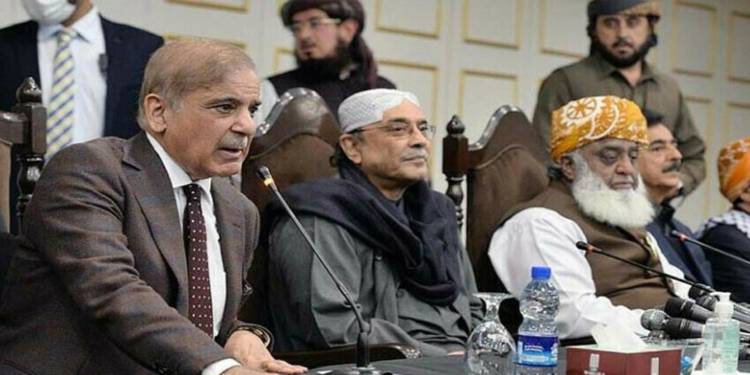
The ruling alliance rejected the eight-member bench formulated to hear petitions against the Supreme Court (Practice and Procedure) Bill 2023.
The coalition government issued a statement rejecting the bench and calling the eight-member bench "controversial" with just a few hours left before the procedure started.
After being sent back by President Dr. Arif Alvi, the bill was approved by a joint session of parliament earlier this week. Raja Amer Khan, Chaudhry Ghulam Hussain, and Mohammad Shafay Munir, among others, then filed three separate petitions under Article 184(3) of the Constitution requesting the supreme court strike down the measure.
Following this development, an eight-member bench was established to examine petitions claiming that the "concept, preparation, endorsement, and passing of the Supreme Court (Practice and Procedure) Bill, 2023 is an act tainted with mala fide".
The bench, led by Chief Justice of Pakistan (CJP) Umar Ata Bandial, will start hearing cases at 11:30 a.m. The other members of the bench are Justices Ijaz ul Ahsan, Munib Akhtar, Sayyed Mazahar Ali Akbar Naqvi, Muhammad Ali Mazhar, Ayesha Malik, Syed Hasan Azhar Rizvi, and Shahid Waheed.
The legislation
The bill, a copy of which is available with The Friday Times, suggests that “every cause, appeal or matter before the Supreme Court shall be heard and disposed of by a bench constituted by the Committee comprising the Chief Justice of Pakistan and two senior-most judges, in order of seniority.”
According to the draft legislation, any matter invoking the exercise of original jurisdiction under Article 184 (3) shall be first placed before the committee of three senior-most judges.
“If the Committee is of the view that a question of public importance with reference to enforcement of any of the fundamental rights conferred by Chapter I of Part II of the Constitution is involved, it shall constitute a bench comprising not less than three judges of the Supreme Court of Pakistan which may also include the members of the Committee, for adjudication of the matter,” it says.
The legislation also calls for appeals within 30 days of a verdict, issued on a suo motu case, and suggests that a bench be formed to hear such an appeal within 14 days.
The coalition government issued a statement rejecting the bench and calling the eight-member bench "controversial" with just a few hours left before the procedure started.
After being sent back by President Dr. Arif Alvi, the bill was approved by a joint session of parliament earlier this week. Raja Amer Khan, Chaudhry Ghulam Hussain, and Mohammad Shafay Munir, among others, then filed three separate petitions under Article 184(3) of the Constitution requesting the supreme court strike down the measure.
Following this development, an eight-member bench was established to examine petitions claiming that the "concept, preparation, endorsement, and passing of the Supreme Court (Practice and Procedure) Bill, 2023 is an act tainted with mala fide".
The bench, led by Chief Justice of Pakistan (CJP) Umar Ata Bandial, will start hearing cases at 11:30 a.m. The other members of the bench are Justices Ijaz ul Ahsan, Munib Akhtar, Sayyed Mazahar Ali Akbar Naqvi, Muhammad Ali Mazhar, Ayesha Malik, Syed Hasan Azhar Rizvi, and Shahid Waheed.
The legislation
The bill, a copy of which is available with The Friday Times, suggests that “every cause, appeal or matter before the Supreme Court shall be heard and disposed of by a bench constituted by the Committee comprising the Chief Justice of Pakistan and two senior-most judges, in order of seniority.”
According to the draft legislation, any matter invoking the exercise of original jurisdiction under Article 184 (3) shall be first placed before the committee of three senior-most judges.
“If the Committee is of the view that a question of public importance with reference to enforcement of any of the fundamental rights conferred by Chapter I of Part II of the Constitution is involved, it shall constitute a bench comprising not less than three judges of the Supreme Court of Pakistan which may also include the members of the Committee, for adjudication of the matter,” it says.
The legislation also calls for appeals within 30 days of a verdict, issued on a suo motu case, and suggests that a bench be formed to hear such an appeal within 14 days.

